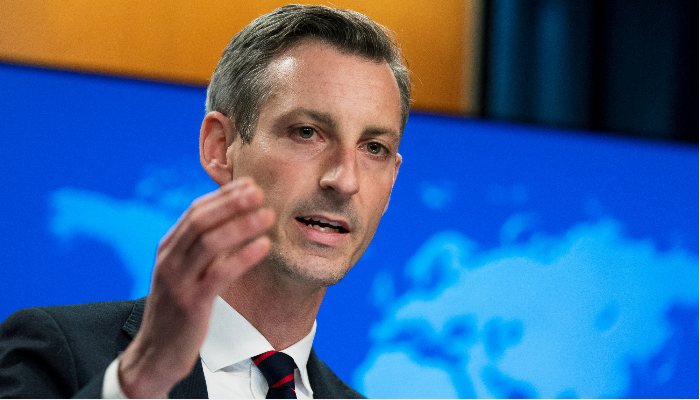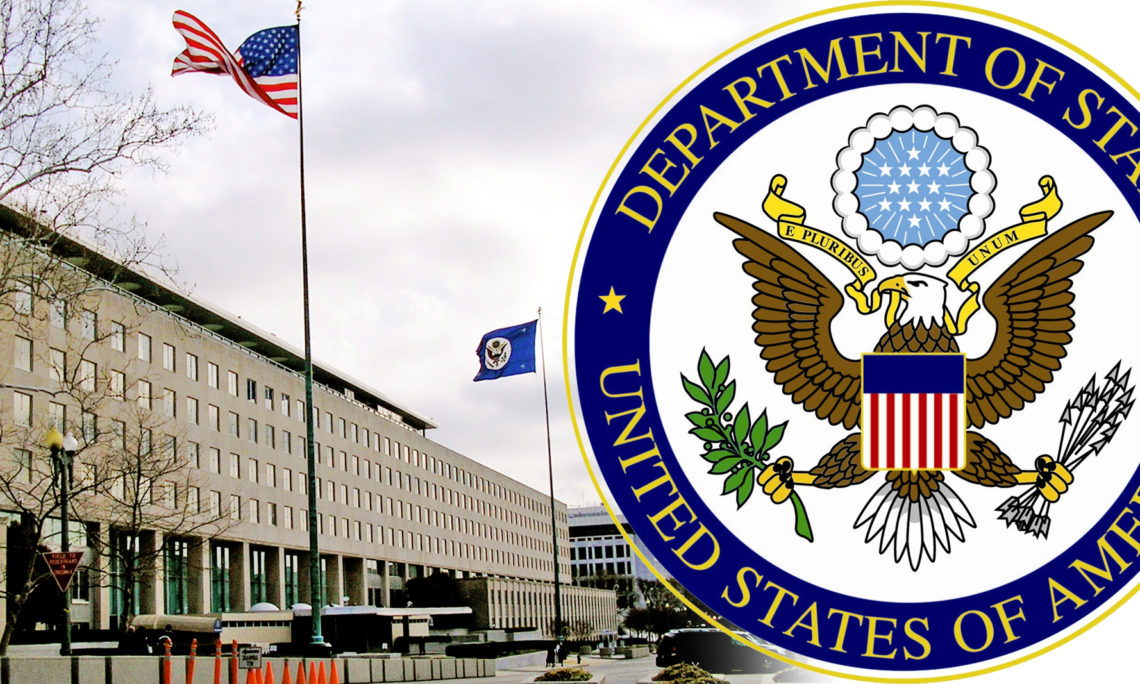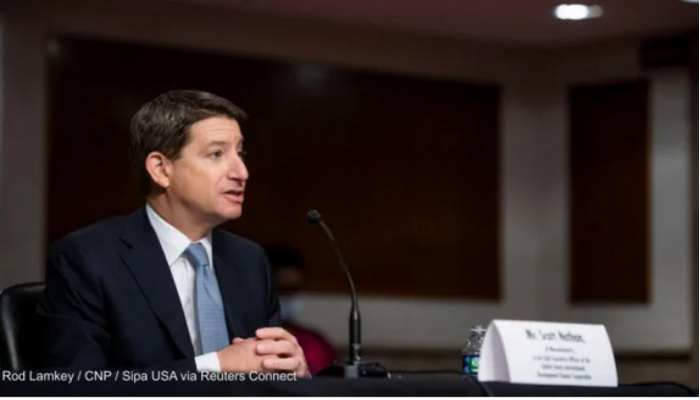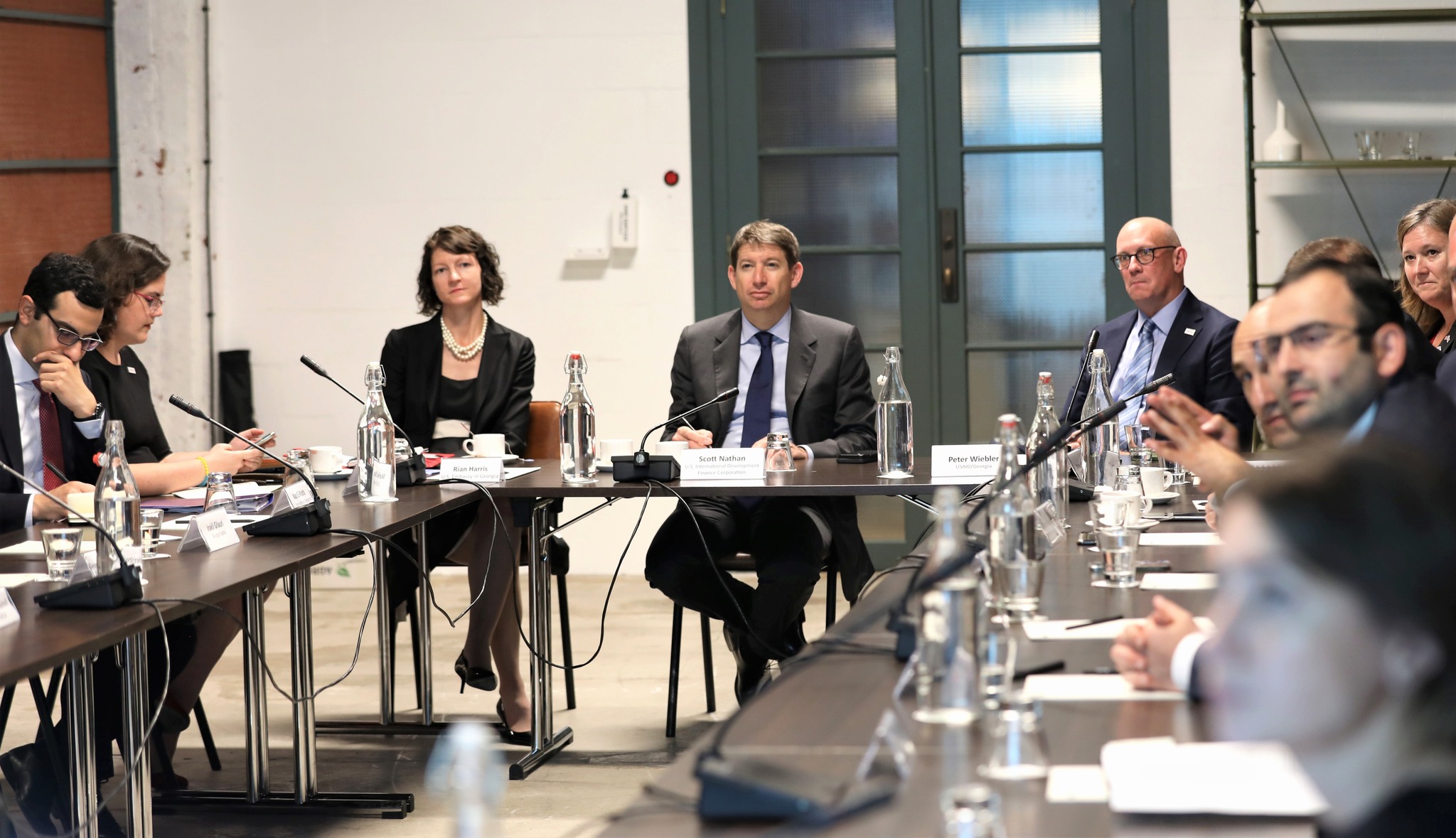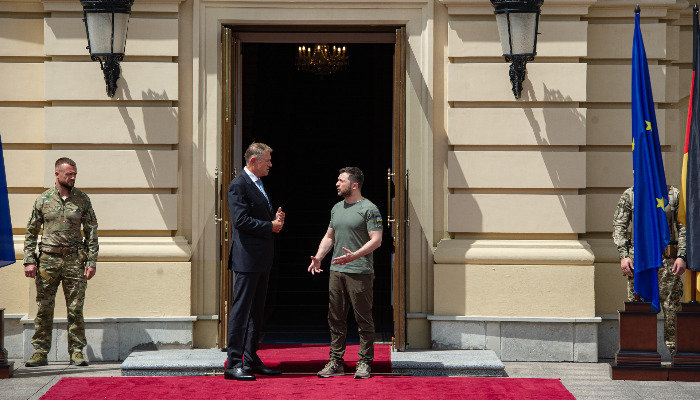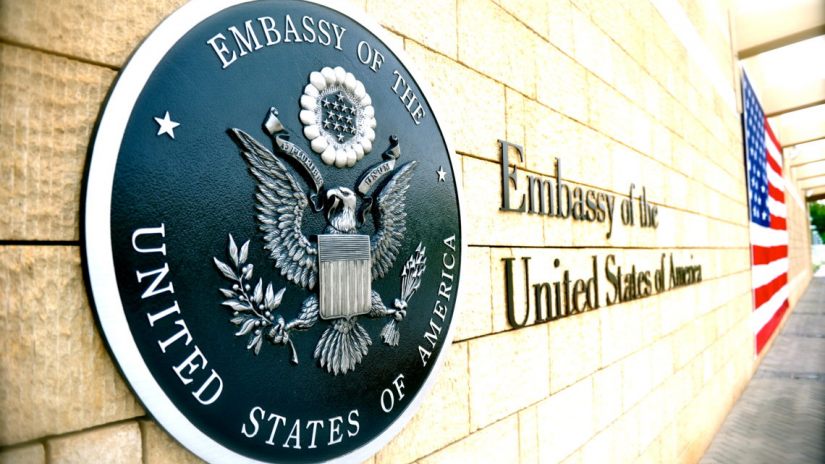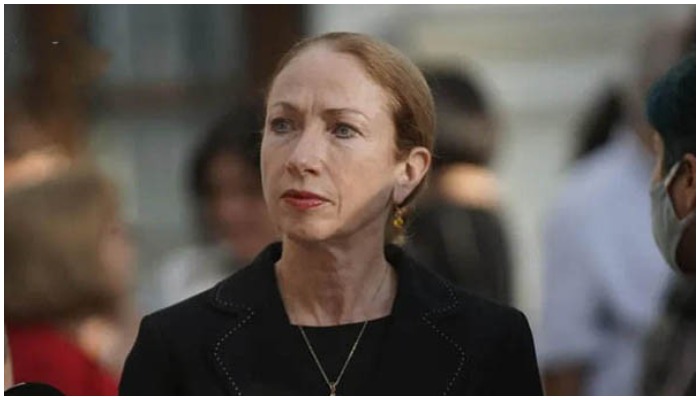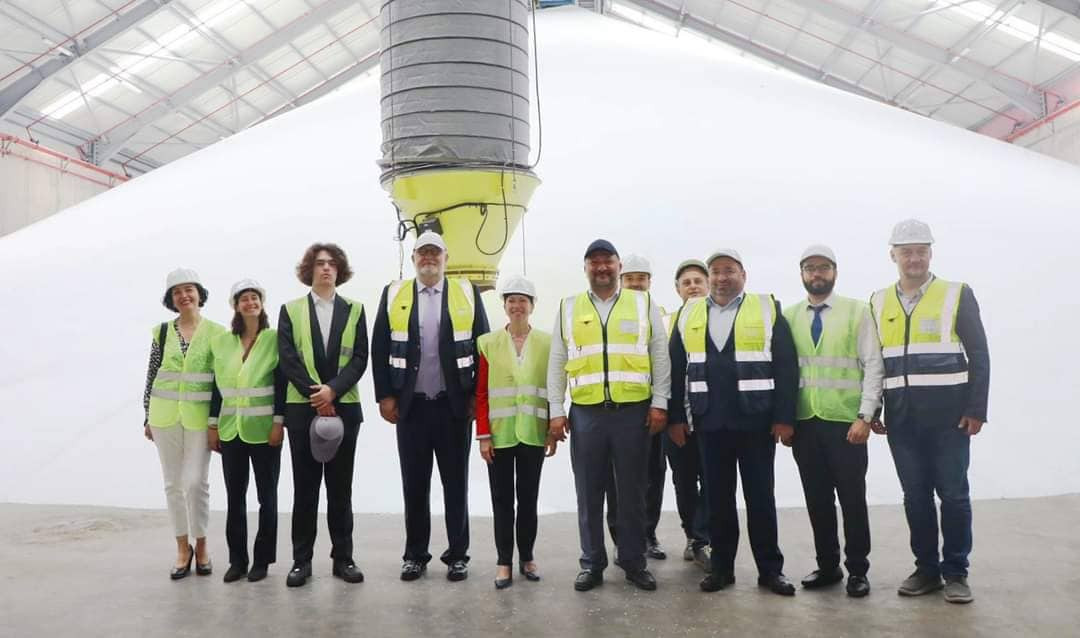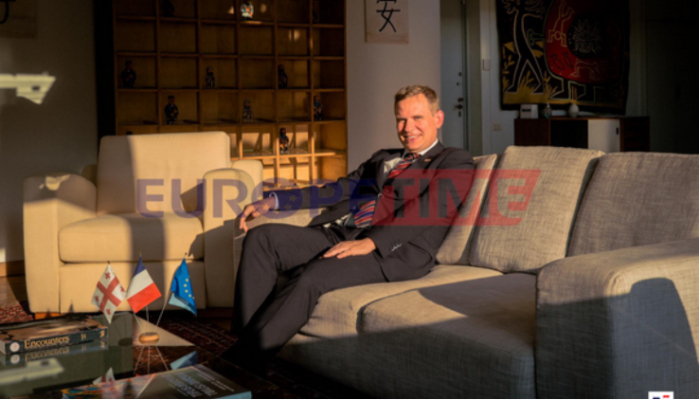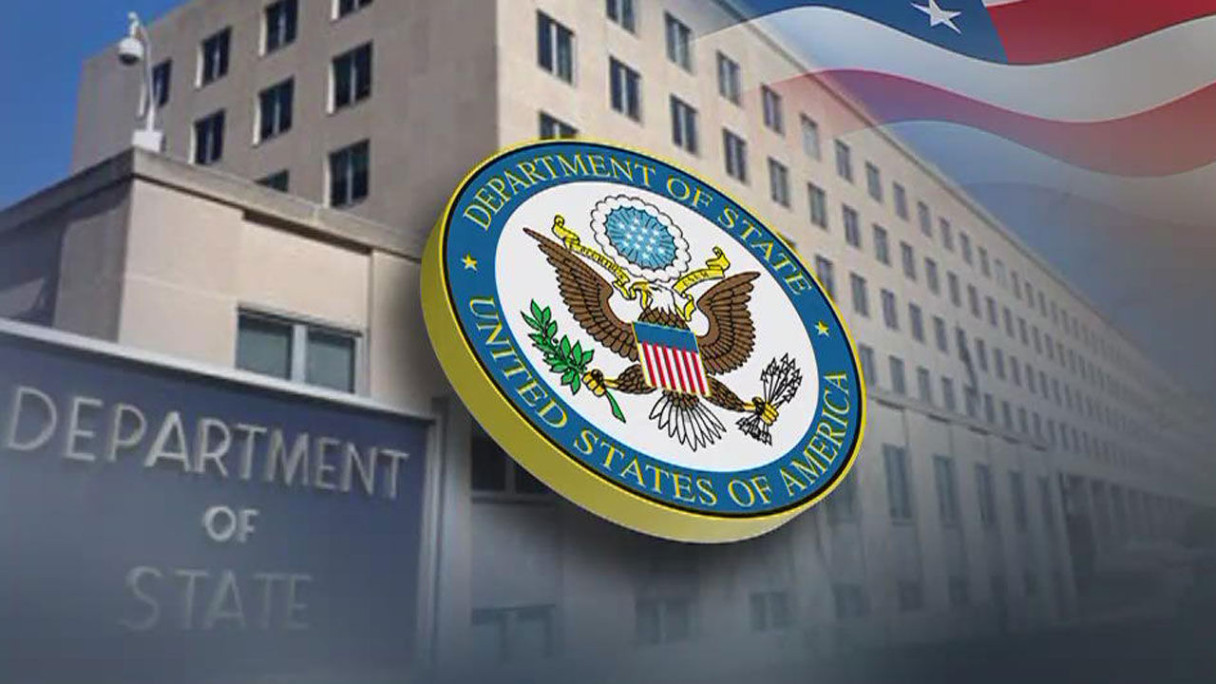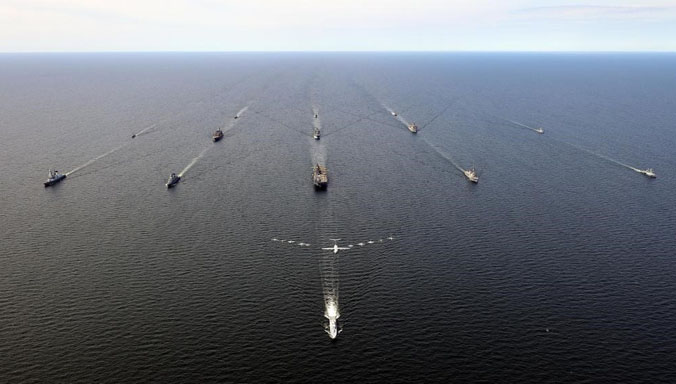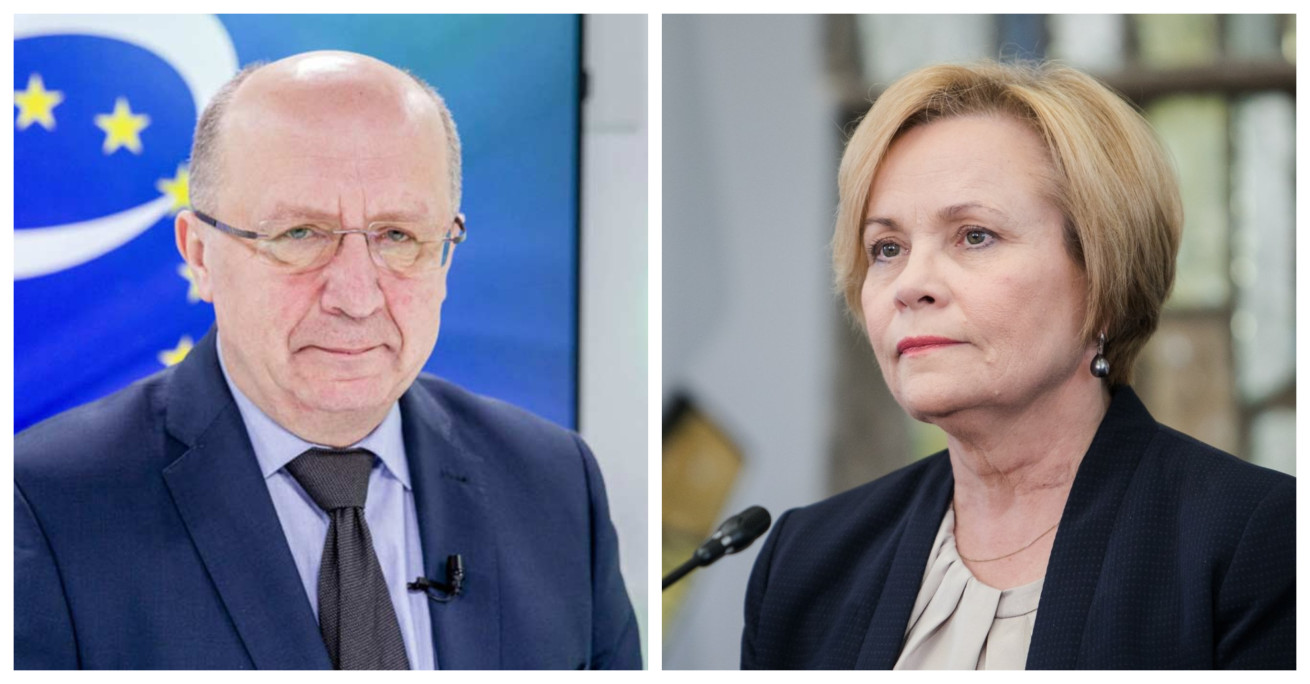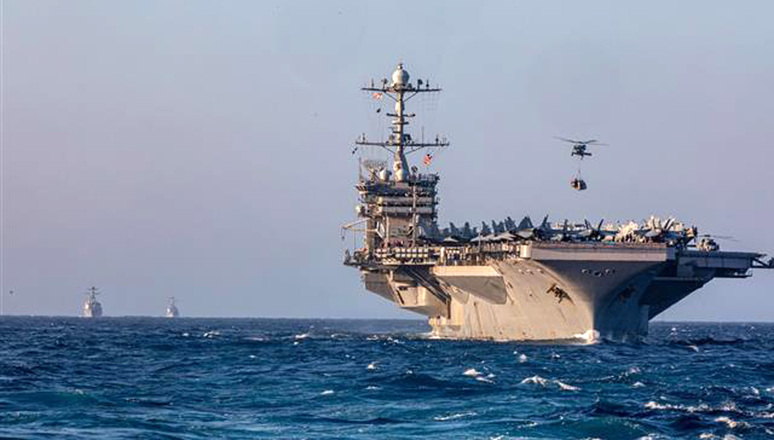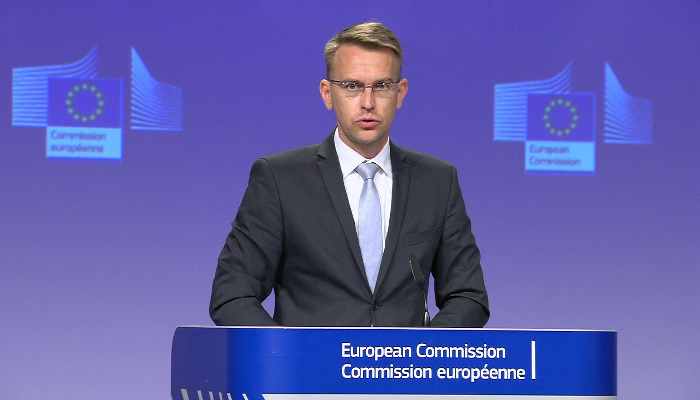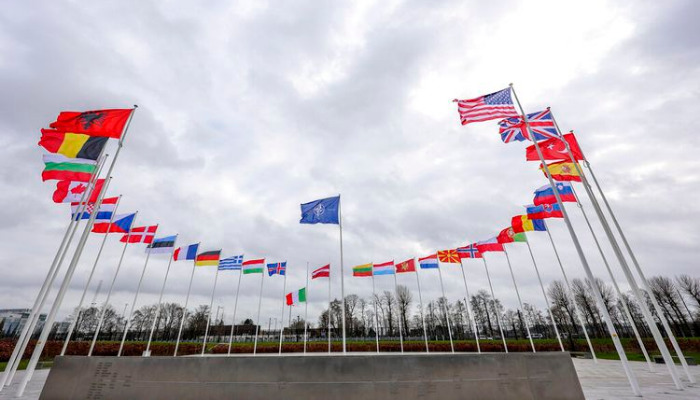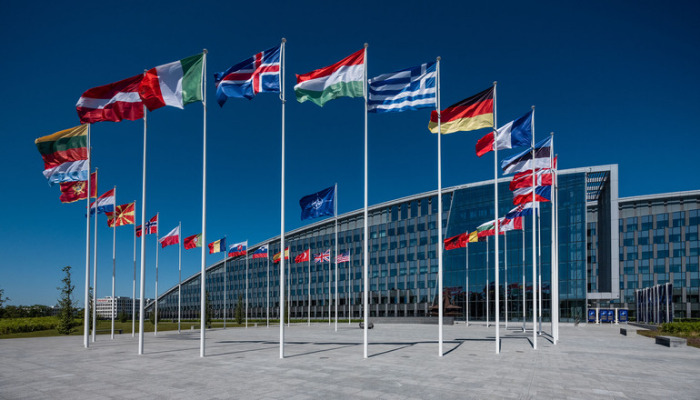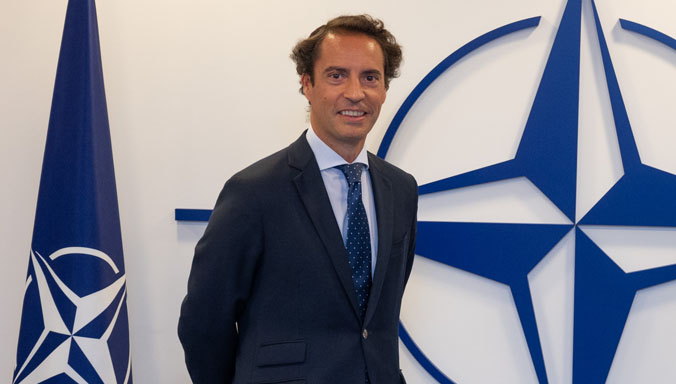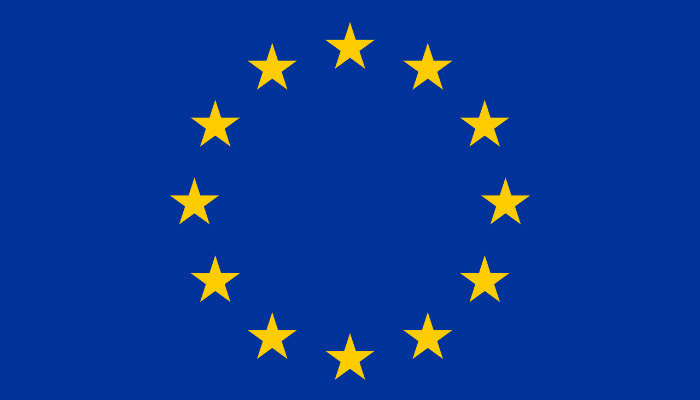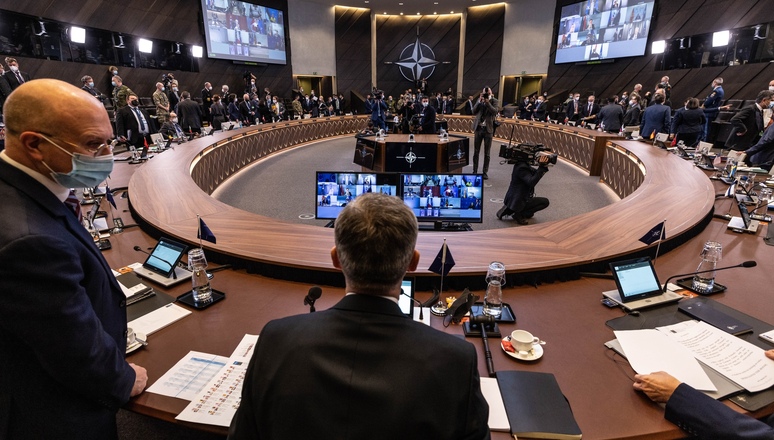Politics
Ned Price: We support the further integration of Ukraine and Moldova and Georgia with their European neighbors
The United States supports the further integration of Ukraine, Moldova and Georgia with their European neighbours, Department of State Spokesperson Ned Price said in a briefing on Tuesday. “We maintain our longstanding commitment to a Europe that is whole, that is free, and that is at peace, and we support the further integration of Ukraine and Moldova and Georgia as well with their European neighbors. For all of these countries, though, these are countries that over the course of now decades have expressed a desire for a closer relationship, closer proximity with the West. The United States has worked with all three of these countries to help them develop their democratic institutions, to help them develop their system of checks and balances; to help them develop their economies that are integrated with Europe and with the West; and we will continue to stand by them going forward”, said Ned Price. The European Commission presented its Opinions on the applications for EU membership submitted by Ukraine, Georgia and the Republic of Moldova as invited by the Council. The European Commission recommended to grant Ukraine and Moldova EU candidate status, while it recommended that Georgia be given the perspective to become a member of the EU, and that candidate status should be granted once a number of priorities have been addressed. The Opinions are based on the Commission’s assessment in light of the three sets of criteria to join the EU agreed by the European Council: political criteria, economic criteria, and the ability of the country to assume the obligations of EU membership (EU acquis). According to a press release from the European Commission, the Opinions also take into account Ukraine, Moldova and Georgia’s efforts in implementing their obligations under the Association Agreements (AA), including the Deep and Comprehensive Free Trade Areas (DCFTA), which cover significant parts of the EU acquis. Ukraine The European Commission has found that Ukraine overall is well advanced in reaching the stability of institutions guaranteeing democracy, the rule of law, human rights and respect for and protection of minorities, and has continued its strong macro-economic record, demonstrating a noteworthy resilience with macroeconomic and financial stability, while needing to continue ambitious structural economic reforms. The country has gradually approximated to substantial elements of the EU acquis in many areas. Moldova The European Commission concludes that the country has a solid foundation in place to reach the stability of institutions guaranteeing democracy, the rule of law, human rights and respect for and protection of minorities; macroeconomic policies have been reasonably sound and progress has been made in strengthening the financial sector and business environment but key economic reforms remain to be undertaken. The country has established a solid basis for further alignment with the EU acquis. Georgia The European Commission assesses that Georgia has a foundation in place to reach the stability of institutions guaranteeing democracy, the rule of law, human rights and respect for and protection of minorities, even if recent developments have undermined the country’s progress; it has achieved a good degree of macroeconomic stability and has a sound record of economic policy and a favourable business environment, but further reforms are needed to improve the functioning of its market economy; overall, Georgia has established a solid basis for further alignment with the EU acquis.
U.S. Department of State: The United States maintains its long-standing commitment to a Europe whole, free, and at peace
The United States maintains its long-standing commitment to a Europe whole, free, and at peace. We support the further integration of Ukraine and Moldova with their European neighbors, including their process toward membership in the European Union, spokesperson for the US Department of State told Europetime. „We remain committed to working with these governments as they continue to undertake the necessary reforms and legislative adaptations necessary for the accession process. The details of the accession processes and timelines are a decision for the EU and its member states, and we would refer to the EU for more information on those specifics“, - said spokesperson for the US Department of State. Ned Price: We support the further integration of Ukraine and Moldova and Georgia with their European neighbors The European Commission presented its Opinions on the applications for EU membership submitted by Ukraine, Georgia and the Republic of Moldova as invited by the Council. The European Commission recommended to grant Ukraine and Moldova EU candidate status, while it recommended that Georgia be given the perspective to become a member of the EU, and that candidate status should be granted once a number of priorities have been addressed. The Opinions are based on the Commission’s assessment in light of the three sets of criteria to join the EU agreed by the European Council: political criteria, economic criteria, and the ability of the country to assume the obligations of EU membership (EU acquis). According to a press release from the European Commission, the Opinions also take into account Ukraine, Moldova and Georgia’s efforts in implementing their obligations under the Association Agreements (AA), including the Deep and Comprehensive Free Trade Areas (DCFTA), which cover significant parts of the EU acquis. Ukraine The European Commission has found that Ukraine overall is well advanced in reaching the stability of institutions guaranteeing democracy, the rule of law, human rights and respect for and protection of minorities, and has continued its strong macro-economic record, demonstrating a noteworthy resilience with macroeconomic and financial stability, while needing to continue ambitious structural economic reforms. The country has gradually approximated to substantial elements of the EU acquis in many areas. Moldova The European Commission concludes that the country has a solid foundation in place to reach the stability of institutions guaranteeing democracy, the rule of law, human rights and respect for and protection of minorities; macroeconomic policies have been reasonably sound and progress has been made in strengthening the financial sector and business environment but key economic reforms remain to be undertaken. The country has established a solid basis for further alignment with the EU acquis. Georgia The European Commission assesses that Georgia has a foundation in place to reach the stability of institutions guaranteeing democracy, the rule of law, human rights and respect for and protection of minorities, even if recent developments have undermined the country’s progress; it has achieved a good degree of macroeconomic stability and has a sound record of economic policy and a favourable business environment, but further reforms are needed to improve the functioning of its market economy; overall, Georgia has established a solid basis for further alignment with the EU acquis.
Chief Executive Officer of the U.S. International Development Finance Corporation Scott Nathan kicks off his official visit to Tbilisi
Chief Executive Officer of the U.S. International Development Finance Corporation (DFC) Scott Nathan kicks off his official visit to Tbilisi. Reads the statement released by the US Embassy in Georgia. According to the Embassy, DFC invests in energy, healthcare, critical infrastructure, and technology around the world, including Georgia. „During his visit, CEO Nathan will meet with local partners, American investors, and government representatives to further Georgia's economic development and support Ukrainian firms affected by the war“, reads the statement.
US Embassy: Georgia, with its immense renewable energy potential, can make great strides toward energy independence
Georgia with its immense renewable energy potential can make great strides toward energy independence. Reads the statement released by the US Embassy in Georgia. According to the Embassy, „to discuss this important issue and ways the U.S. Government can support this mission, U.S. International Development Finance Corporation's Scott Nathan met with our contacts in the renewable energy sector“. Chief Executive Officer of the U.S. International Development Finance Corporation Scott Nathan kicks off his official visit to Tbilisi Chief Executive Officer of the U.S. International Development Finance Corporation (DFC) Scott Nathan kicked off his official visit to Tbilisi. According to the Embassy, DFC invests in energy, healthcare, critical infrastructure, and technology around the world, including Georgia.„During his visit, CEO Nathan will meet with local partners, American investors, and government representatives to further Georgia's economic development and support Ukrainian firms affected by the war“, reads the statement.
Romanian president says granting EU candidate status to Ukraine, the Republic of Moldova, and Georgia is key to building a strong and lasting shield around all values
CNN Romanian President Klaus Iohannis invited the European Union to grant Ukraine candidacy status, stressing “there is no time for hesitancy” while speaking alongside his Ukrainian, French, German and Italian counterparts during a historic visit to Kyiv on Thursday. “We are at a turning point in European history,” he said. “Extraordinary times call for an extraordinary strategic and visionary response. Granting EU candidate status to Ukraine, the Republic of Moldova and Georgia at the European Council next week, is key in building a strong and lasting shield around all values,” he added. “It is about our capacity to project security and stability in our neighborhood. There is no time left for hesitancy. Our partners need for us to step up our long-time support to help them build resilience and cope with a wide array of overlapping challenges, either conventional or hybrid,” he said. Speaking alongside him, French President Emmanuel Macron, German Chancellor Olaf Scholz and Italian Prime Minister Mario Draghi also pledged their support for granting Ukraine candidate status to join the EU.
US Embassy: With the collaborative support from the West, Georgia and Ukraine stand - as much as the independence of these countries might annoy Russia, the United States will not turn its back on its partners
The Russian disinformation machine believes that by repeating absurd lies, the reality will change, and they will rewrite history. reads the statement released by the US Embassy in Georgia. According to the Embassy, as much as the independence of Georgia and Ukraine might annoy Russia, the United States will not turn its back on its partners. According to the Embassy, The facts, however, are such: 1991 Russia invades Georgia 2008 Russia invades Georgia 2014 Russia invades Ukraine 2022 Russia invades Ukraine Russia blames everyone but itself for these and other hostilities. If we believe them, Ukraine itself, NATO, the United States, and however surprising it might be - Jewish Nazis started the war in Ukraine. With the collaborative support from the West, Georgia and Ukraine stand, maintaining their sovereignty and independence. As much as the independence of these countries might annoy Russia, the United States will not turn its back on its partners. The west is more united than ever“, - reads the statement.
Ambassador Degnan says it is a hundred percent Russian disinformation that the United States is working against Georgia or trying to drag Georgia into the war
„Almost everything that we have done and are doing here in Georgia is designed to support the people of Georgia’s desire to be part of the European Union and to be part of NATO”, US Ambassador to Georgia Kelly Degnan told reporters in Batumi on Monday. According to the ambassador, the US will continue to be fully committed to Georgia’s sovereignty, its territorial integrity, and to its desire to be fully integrated into the Euro-Atlantic family of nations. US Ambassador is visiting the Adjara region to mark the 30th anniversary of US-Georgia diplomatic relations. „It is a hundred percent Russian disinformation that the United States is working against Georgia or trying to drag Georgia into the war. What the European Union – what NATO stands for is peace, stability, prosperity. You can see it in every country you’re in: the stability and prosperity and the peace that come with being part of the Euro-Atlantic community“. „I won’t speak on behalf of the Prime Minister, but what I can say is I don’t know anybody in Georgia who wants Georgia to be part of this war. I think everybody in Georgia is – and certainly, the United States is very aware - of what Georgians have gone through and how they are feeling. What’s going on in the outpouring of humanitarian assistance and support for Ukraine is a good indication of where Georgians’ hearts are in this fight. What is really needed is not this fighting amongst Georgians. It’s for Georgians to come together. This is one issue where I would hope Georgia’s leaders could put aside their differences and come together in the interest of this country’s future: in the interest of this country’s stability and prosperity. Unity is what is needed right now, not more fighting: unity. I would love to see Georgians live up to their motto of „Strength is in Unity“ that’s what’s needed right now“, - Ambassador Degnan added.
The United States supports Georgian economic development, the Multimodal Terminal in Batumi is an example of this support - The US Embassy
On the occasion of the 30th anniversary of US-Georgia diplomatic relations, US Ambassador Kelly Degnan paid a visit to the Batumi Multimodal Terminal. The US Embassy in Georgia has made relevant material public. According to the U.S. embassy the United States supports Georgian economic development by working with American firms to enter and compete in Georgian markets and the Multimodal Terminal in Batumi is an example of this support, representing the biggest American investment in the Adjara region. „During her visit to the terminal Ambassador Degnan noted how such investments pave the way for other U.S. businesses to look at the Georgian market and utilize its potential as a transportation, logistics, and commercial hub“, - the U.S. embassy said. A new multimodal terminal in Batumi port opened in june, 2021. Its capacity is up to 1.5 million tons per year. The project investors are the American corporation Trammo together with Wondernet Express Investment Group. The construction of the terminal began in 2019, and the investments in the project reach $25 million.
Now is really no time for infighting. It is time to move forward as much as possible on all issues that would strengthen Georgia’s democratic institutions - Diego Colas
French Ambassador to Georgia, Diego Colas believes that new opportunities have arisen for even closer relations between Georgia and the European Union. „I believe that new opportunities arise for an even closer relations between Georgia and the European Union. President Macron has been explicit in his willingness to see the process that has been started by the accession candidacies of Ukraine, Georgia and Moldova advance. We will see how the Commission proposes to move forward. This is a great opportunity, and it is important for Georgians of all political persuasions to unite to seize these opportunities. And so my message is twofold: first, now is really no time for infighting. Second, it is time to move forward as much as possible on all issues that would strengthen Georgia’s democratic institutions and thereby convincingly show that the country is ready to assume the rights and obligations of a future Member State“, - Ambassador Extraordinary and Plenipotentiary of the French Republic to Georgia, Diego Colas, said in an exclusive comment with Europe Time. The European Parliament has adopted a joint resolution initiated by five political groups of the European Parliament on violations of media freedom and the safety of journalists in Georgia. The resolution was supported by 308 MEPs, while 218 opposed. With this resolution, the European Parliament calls on the EU institutions to work on granting Georgia the status of a candidate member of the EU. However, on the condition that the Georgian government follows the recommendations of the European Parliament.
The State Department on "3+3" format: Before launching other platforms for discussion, Russia should concentrate on withdrawing its troops from all countries in the region and contributing to peace
As a State Department spokesperson told Europetime, Russia should focus on withdrawing its troops from all countries in the region and contributing to peace before initiating other discussion platforms. „We encourage the countries of the South Caucasus to work together to resolve disputes and to strengthen regional cooperation. While outside actors can play a productive role supporting such efforts, they should not try to impose their own agenda on the region. Russia, which is currently waging a brutal war in Ukraine, has killed thousands and displaced millions more. It should focus on withdrawing its troops - from all countries in the region-and contributing to peace before initiating other discussion platforms“, - a State Department spokesperson told Europetime. The next meeting on the South Caucasus issues in the "3 + 3" format (Azerbaijan, Armenia, Georgia - Russia, Turkey, Iran) will be held in the near future, Russian Foreign Minister Sergei Lavrov said at a press conference after meeting with his Turkish counterpart. "We agreed on how to continue working in the South Caucasus. As you know, a 3 + 3 format was created on the initiative of Turkey. We held the first meeting in Moscow, where Georgian colleagues could not take part, but we emphasize that we will always be happy with their participation. The next meeting is being prepared now, I hope we will be able to announce it in the near future," Lavrov said. Georgia refused to take part in the first meeting, which took place in Moscow on December 10, 2021. EU Spokesperson: We are supporting the three South Caucasus countries, including through the Eastern Partnership Following the Nagorno-Karabakh conflict, which is a landlocked region in southwest Azerbaijan near the southeastern border of Armenia, in 2020 Turkish President Recep Tayyip Erdogan put forward the idea of launching a six-nation platform that includes the cooperation of Turkey, Azerbaijan, Armenia, Georgia, Russia and Iran in order to establish stability and peace in the region. Georgia and Russia suspended their diplomatic ties following the Russia-Georgia war in 2008 when it declared the independence of Georgia’s occupied Abkhazia and Tskhinvali (South Ossetia) region on August 26, 2008.
16 NATO Allies and partners take part in exercise BALTOPS 22
Fourteen NATO allies along with two NATO partner nations, Finland and Sweden, are currently participating in the exercise Baltic Operations (BALTOPS 22) with over 45 ships, more than 75 aircraft and 7,500 personnel. This premier maritime-focused annual exercise kicked off from Stockholm, Sweden, on 05 June. It takes place in the Baltic region from June 5-17 and provides a unique training opportunity to strengthen combined response capabilities critical to preserving freedom of navigation and security in the Baltic Sea. This is the 51st iteration of the exercise series, which began in 1972. Participating nations include Belgium, Bulgaria, Denmark, Estonia, Finland, France, Germany, Latvia, Lithuania, the Netherlands, Norway, Poland, Sweden, Turkey, the United Kingdom, and the United States. These countries will exercise a range of capabilities demonstrating the inherent flexibility of maritime forces. Exercise scenarios include amphibious operations, gunnery, anti-submarine, air defence, mine clearance operations, explosive ordnance disposal, unmanned underwater vehicles, and medical response. BALTOPS 22 takes place in Sweden, and coincides with the 500th anniversary of the Swedish Navy. BALTOPS 22 also features more robust medical response scenarios, specifically during personnel recovery training aboard a submarine. The exercise builds on previous iterations by enhancing the incorporation of the space domain through the NATO Space Center.
The Commission has started to work swiftly on the opinion and is now assessing all the replies received to the questionnaire by Georgia
EXCLUSIVE The European Commission has started to work swiftly on the opinion and is now assessing all the replies received to the questionnaire submitted to help prepare the opinion—the first part covering the political and economic situation and the second part the other chapters of the EU acquis. According to a Spokesperson, Ana Pisonero Hernandez, Following the EU membership application submitted by Georgia, the Council has acted swiftly and invited the Commission to submit its Opinion on the application in accordance with the relevant provisions of the Treaties. The Commission will move forward quickly to finalise the Opinion as soon as possible. Decisions on future steps on the EU path will continue to be in the hands of the Member States. As you may have seen, yesterday EU leaders took note of the preparation of the Commission’s Opinions on the application for EU membership of Georgia, Ukraine and the Republic of Moldova, and will return to this matter at their June meeting“, - Spokesperson said.
MEPs' open letter to the Georgian people
Andrius KUBILIUS, Member of the European Parliament, Co-President of the Euronest PA, twice former Prime Minister of Lithuania, Rasa JUKNEVIČIENĖ, Member of the European Parliament, EPP Vice-Chair, former Minister of Defense of Lithuania made a joint letter supporting Georgia’s path to the EU. The letter is invariably offered by Europetime. „In mid-June, the European Commission will come out with much-awaited recommendations on EU candidate status for Ukraine, Moldova and Georgia. Then, at the end of June, the Governments of the EU Member States will take the final decision in the European Council. The outcome of this process is difficult to predict. With this open letter, we want to encourage Georgian political powers and the Georgian people not to be disappointed in case the result will be less optimistic, but instead, to finally join forces for common work to bring Georgia to the EU. For a long time, Georgia was at the forefront of the path towards EU integration. A few years ago academic analyses showed, that Georgia was the best-prepared country, even if evaluating not only EaP countries but assessing the Western Balkans also. However, today the prevailing perception in the European Union, and the European Parliament, is that the situation in Georgia has deteriorated in the last couple of years. Despite many warnings, the current Government did not do a proper job to maintain Georgia at the forefront of EU integration. This also made the work of friends of Georgia in the EU and USA much more difficult. As a result, looking with outsiders' eyes, the picture is rather bleak at this time. The oligarchisation and consequently polarisation in Georgia remains high and concentrated in the hands of one person who is not accountable to the people through democratic elections. Moldova, for example, had similar issues with Plakhotniuk and Dodon, but it has managed to address them through the process of democratic elections. The former President of Georgia is jailed. You all may remember how Ukraine's rapprochement with the EU was affected when former Prime Minister Yulia Tymoshenko was imprisoned and one can draw conclusions onthe solution. Regretfully, despite the unprecedented EU's highest-level efforts to help solve the political impasse in Georgia and move the pro-European agenda, the “Charles Michel Agreement” has not been implemented until now. Moreover, just as the Commission started drafting the recommendation on EU candidate status for Georgia, a sentence was issued to the owner of a media outlet critical of the Government, adding yet another dark mark to the pictureof Georgia. In addition, the Georgian ruling party's position on Ukraine and EU sanctions on Russia in the background of Russia's war of aggression against Ukraine is difficult to understand. Ukrainians are defending not only their territory and homes, but also democracy, freedom, and European values, which are important to Georgia too. Ukraine merits unwavering support from every one of us and a simple understanding that Ukraine, as an icebreaker, is also opening the doors towards candidate status for Moldova and Georgia. We know that the Georgian people think so too. All in all, sometimes we cannot help but think that somebody in the ruling circles in Georgia is actively doing everything to stop Georgia from joining the EU. If they succeed, this will be a terrible loss not only for Georgia, but also for the EU, and big win for Putin's regime. The European Commission is always taking into account the whole picture when evaluating the readiness of an applicant country. Respect for democracy, rule of law and human rights is as important as the legal and economic alignment with the EU acquis. The political criteria of EU accession are very attentively scrutinized. There are clear historic examples when non-democratic tendencies in an applicant country have been not only strongly criticized by the EU, but have also put on hold its EU accession. This happened with Slovakia's EU bid under Prime Minister Vladimir Mečiar. Mečiar's power grab and poor record of human rights in Slovakia resulted that in 1997 the country did not get the invitation to join the group of Central-Eastern European states to start the accession negotiations with the EU, due to a democracy deficit. At that time, the absolute majority of Slovaks were strongly supporting their country's membership in the EU. However, the popular support alone is not enough for accession. Democracy, human rights and rule of law must be sufficiently rooted in an applicant country to start the negotiations process. Only when Mečiar lost elections in 1998, the process of catching up with the 1st accession group could begin. The new Government led by Mikulaš Dzurinda had a very difficult task to mend tarnished international image of Slovakia and prove that all faults of Mečiar's era were being fixed. They succeeded, and Slovakia is a successful EU Member State since 2004. Granting EU candidate status is not a matter of convincing us, friends of Georgia, by words, it is a matter of real commitment and united effort that has to be demonstrated by the Government, the political opposition, and the people. The Georgian Government must realize that a solution to Georgia's problems is in Tbilisi, not in Brussels. If this challenge is too big for this Government, there are democratic ways to pass it over to others, without grabbing onto the chairs at all costs. On the other hand, the opposition parties must also find the strength to rise above separate issues and propose a credible strategy of European integration to the people of Georgia and to show a credible leadership, which is needed for such a task. If not, it may come to a point where the people of Georgia will have to decide what they choose - the current political structure with B. Ivanishvili and the Georgian Dream in the lead of the country, or the European future of Georgia“.
US carrier group, amphibious assault ship placed under NATO command
The USS Harry S. Truman aircraft carrier strike group and other US naval vessels have come under NATO command as part of a series of major military drills in the Baltic, Adriatic and Mediterranean Seas. In support of Allied Joint Force Command Brunssum and Allied Joint Force Command Naples, NESH 22 is the execution phase of a long series of activities known as Project Neptune, conceptualized in 2020. As a day-to-day activity, NESH 22 will involve the participation of multiple nations. The already planned participating nations are: Albania, Bulgaria, Croatia, Denmark, France, Germany, Greece, Italy, Latvia, Lithuania, Netherlands, Poland, Portugal, Romania, Slovenia, Spain, Turkey, the U.K. and the U.S. The activity focuses on overcoming the complexities of integrating command and control of a carrier strike group, an amphibious ready group and a Marine expeditionary unit to NATO. During NESH 22, we will conduct the handover of command and control of the USS Harry S. Truman Carrier Strike Group (CSG) and the Combined Task Force 61/2, which includes the USS Kearsarge Amphibious Ready Group (ARG), and the 22d Marine Expeditionary Unit (MEU) from SIXTHFLT to STRIKFORNATO and the wider Alliance. General Tod D. Wolters, Commander, Supreme Allied Command Europe (SACEUR) looks forward to the execution of NESH22 by referring to it as an establishment of the unity that NATO strives for throughout the Alliance. Gen. Wolters adds, "Vigilance activities like NESH22 strengthen our ability to seamlessly integrate maritime strike capabilities to support deterrence and defence. We continue to do everything necessary to shield the Alliance." Vigilance Activities are a base line, or normal day-to-day activities, occurring in all domains, and across SACEUR's Area of Responsibility to ensure appropriate strategic awareness and force readiness required to sustain peace. "NESH22 is an excellent opportunity for improving the capacity to coordinate with Allies in continuing vigilance in order to train for NATO multi-domain and joint operations," Commander, Allied Joint Force Command Brunssum, General Jörg Vollmer. "NATO's commitment to promoting peace and security in the Euro-Atlantic area is clearly expressed by the integration of our forces' capability to rapidly respond in a time of crisis." Quick facts: NESH22 allows participants to learn from each other and strengthen relationships with Allies in the region. The value of NESH 22 contributes for the success of our long-standing Alliance while improving the overall cohesion of the Alliance. It also bolster the Alliance's capability to exercise flexible command and control structures and for all members of the Alliance to contribute to collective defense of the European continent. NATO is committed to supporting, promoting and operating within international laws and conventions. The Alliance's actions are always defensive in nature and proportionate in posture. The cohesion of NATO Allies and partners on both sides of the Atlantic have kept the region free from major conflicts for 70 years. Previous events in the Neptune series include table-top exercises at SIXTHFLT headquarters in Naples, Italy, a STRIKFORNATO embark (2021) on board USS Mount Whitney (NEPTUNE CHALLENGE) and a vigilance activity early this year called NEPTUNE STRIKE. This vigilance activity kicked off from the Adriatic Sea, and involved missions at sea and in the air across most of Europe, supporting both Allied Joint Force Command Naples and Brunssum. STRIKFORNATO led a maritime force composed of two carriers, 15 ships and approximately 90 aircraft, including forces from the Harry S. Truman CSG, the Italian Navy CAVOUR CSG, Standing NATO Maritime Group 2 and Mine Counter Measure Group 2. Overall, forces and personnel from 28 NATO countries participated in NEPTUNE STRIKE. SIXTHFLT, headquartered in Naples, Italy, conducts the full spectrum of joint and naval operations, often in concert with allied and interagency partners, in order to advance U.S. national interests and security and stability in Europe and Africa. STRIKFORNATO, headquartered in Oeiras, Portugal, is Supreme Allied Commander Europe's (SACEUR) premier, rapidly deployable and flexible, maritime power projection Headquarters, capable of planning and executing full spectrum joint maritime operations.
The European Union supports the territorial integrity and sovereignty of Georgia, as recognised by international law
In an exclusive comment with Europe Time Peter Stano, EU Spokesperson for Foreign Affairs and Security Policy says the European Union supports the territorial integrity and sovereignty of Georgia, as recognised by international law. „With regard to the so-called presidential elections that took place in the Georgian breakaway region of South Ossetia on 10 April and 8 May, we recall that the European Union does not recognise the constitutional and legal framework in which they took place. The EU will continue to pursue its policy of non-recognition and engagement, including through the EU Special Representative and the EU Monitoring Mission“, - Peter Stano said. The Ministry of Foreign Affairs of Georgia condemns the second round of the so-called presidential elections conducted by Russia in the occupied Tskhinvali region on May 8. The Ministry of Foreign Affairs calls on the international community to properly assess and effectively respond to another further illegal action against Georgia's sovereignty and territorial integrity.
An official says Javier Colomina’s ongoing visit to Georgia is part of regular consultations held by NATO officials with their Georgian counterparts
A NATO official told Europetime that NATO Special Representative for the Caucasus and Central Asia, Javier Colomina’s ongoing visit to Georgia is part of regular consultations held by NATO officials with their Georgian counterparts. In addition, it is a reflection of the long-standing and solid political and practical partnership developed between NATO and Georgia. „NATO highly values Georgia’s continued contributions to Euro-Atlantic security. During his visit, Mr. Colomina will meet with a wide range of Georgian civilian and military officials, members of Parliament and representatives of the civil society“, - a NATO official told Europetime. Related article A Nato official says NATO highly values Georgia’s long-standing contributions to Euro-Atlantic security
An official says NATO highly values Georgia’s long-standing contributions to Euro-Atlantic security
A NATO official told Europetime that Mr. Appathurai's recent visit to Georgia was part of regular consultations held by NATO officials with their Georgian counterparts. In addition, it reaffirms that the NATO-Georgian political and practical partnership rests on a very solid track and that NATO highly values Georgia’s long-standing contributions to euro-atlantic security. `Mr. Appathurai’s recent visit to Georgia is part of regular consultations held by NATO officials with their Georgian counterparts. It provided an important platform to reaffirm that the NATO-Georgian political and practical partnership rests on a very solid track and the NATO highly values Georgia’s long-standing contributions to euro-atlantic security. In light of Russia’s unprovoked and unlawful invasion of Ukraine, as NATO Secretary General Stoltenberg has recently said: "NATO Allies have decided to help strengthening the resilience of those partners at risk from Russian threats and interference, including Georgia and Bosnia and Herzegovina." For Georgia, we could increase our support by building on the substantial NATO-Georgia Package, including in areas like situational awareness, secure communications, and cyber`, - a NATO official told Europetime. During his visit to Georgia, NATO’s Deputy Assistant Secretary General for Emerging Security Challenges, James Appathurai, has met with Georgia’s Parliamentary Defense and Security Committee to discuss cyber and energy security. At a press briefing after the closed meeting, the NATO official said the Alliance has decided to do more for Georgia and other partners in Europe, as Russia’s war against Ukraine fundamentally changed the security map of the continent for the long term. The NATO official said the alliance has certain ideas for the country to bolster its security in that regard, as well as in the context of hybrid attacks and coordinated disinformation. The Deputy Assistant Secretary General expects that by the time of the Madrid Summit in June NATO will have very concrete ideas in place to help Georgia. The official added he also expects Allied Governments to reiterate at the Madrid Summit that NATO’s door remains open to Georgia. But the Allied states also wish to see continued reforms and a less polarized political environment here, seeing government and opposition work together, to see decisions take across the political divide. „Cyber-attacks have been part of Russia’s attack on Ukraine before military hostilities started and throughout military hostilities“, Appathurai noted, adding it has become crucial for Georgia and every NATO country to beef up their cybersecurity. As for energy security, NATO’s Appathurai stressed that Georgia’s role in supply to Europe has only become more important as European countries have cut off a delivery from Russia. In this context, he highlighted the importance of cooperating with Georgia to better secure its energy infrastructure against cyber or physical attacks. A meeting of the North Atlantic Council (NAC) at the level of Ministers of Foreign Affairs took place at the NATO Headquarters on 6 and 7 April 2022. “Allies have been doing a lot, and are determined to do more, now, and for the medium and longer term to help the brave Ukrainians defend their homes and their country, and push back the invading forces […] Allies agreed that we should also help other partners to strengthen their resilience. And shore up their ability to defend themselves. Including Georgia, and Bosnia and Herzegovina. For Georgia, we could increase our support through the Substantial NATO-Georgia Package. Including in areas like situational awareness, secure communications, and cyber,” stated NATO Secretary General Jens Stoltenberg at the press conference following the meetings. Ministers also agreed that NATO’s next Strategic Concept, a roadmap for the Alliance’s continued adaptation for the more dangerous and competitive world we live in, must take account of NATO’s future relations with Russia, and China’s growing influence on Allied security. The Strategic Concept will be finalised at the Madrid Summit in June. The 30 Allied Foreign Ministers were joined by their counterpart from Georgia, Ilia Darchiashvili, and from other close partner countries.
NATO political consultations with Armenia, Azerbaijan and Georgia
Last week,the NATO Secretary General's Special Representative for the Caucasus and Central Asia, Mr. Javier Colomina, travelled to the South Caucasus, visiting Armenia, Azerbaijan, and Georgia. He held political consultations with the President and Prime Minister of Armenia, the Prime Minister of Georgia and the President of Azerbaijan, as well as other senior Government officials. A Nato official says Javier Colomina’s ongoing visit to Georgia is part of regular consultations held by NATO officials with their Georgian counterparts A Nato official says NATO highly values Georgia’s long-standing contributions to Euro-Atlantic security In Georgia he also took part in a session of the Parliament’s Security and Defence Committee and met with representatives of the civil society. The discussions focused on regional security issues and the prospects for further political dialogue and practical cooperation with these important partner countries, especially in the context of Russia’s unprovoked and brutal invasion of Ukraine and of the final preparations for the 2022 NATO Summit in Madrid, at the end of June. This was his second official trip to the South Caucasus, since his appointment in September 2021.
The European Commission has started to assess the replies to the first part of the questionnaire completed by Ukraine
The European Commission has started to assess the replies to the first part of the questionnaire completed by Ukraine, A Commission spokesperson told Europetime The President of the Commission handed over to President Zelenskyy the questionnaire covering the political and economic criteria on 8 April. The part covering the implementation of the EU acquis was submitted to Ukraine on 13 April. The Commission has started to assess the replies to the first part of the questionnaire, which we received on 17 April. We expect to receive replies to the second part of the questionnaire within four weeks (by mid-May) and we remain ready to support Ukrainian authorities in this important process. The replies will help the Commission prepare its assessment of Ukraine’s application in light of the memberships criteria. The questionnaires are internal documents to help the Commission prepare the Opinions, therefore these documents are not published by the Commission. Once adopted by the Commission, the Opinions are made public. Decisions on the next steps are in the hands of the Council. European Commission President Ursula von der Leyen handed the questionnaire to Zelenskiy during her visit to Kyiv on April 8th. Ukraine completed its questionnaire for EU membership on April 18th. Ukrainian President Volodymyr Zelensky said on Tuesday he had discussed the increase of aid for Kiev with the European Commission President Ursula von der Leyen. The parties talked about the increase of security assistance to Ukraine amid the conflict with Russia and the post-war reconstruction, Zelensky tweeted.According to Zelensky he informed von der Leyen about the provision of the completed European Union (EU) questionnaire, which is a step toward Ukraine's EU integration. For her part, von der Leyen tweeted that in their talks, the sides touched upon financial and security assistance for Kiev, and Ukraine's replies to the questionnaire on EU membership.
An extraordinary meeting of NATO Ministers of Defence will take place on Wednesday
A meeting of the North Atlantic Council (NAC) at the level of Defence Ministers will take place on Wednesday 16 March 2022. Ministers will meet in person. The meeting will be chaired by the NATO Secretary General, Jens Stoltenberg. The Ministers of Defence of Georgia, Ukraine, Finland and Sweden, as well as the European Union's High Representative for Foreign Affairs And Security Policy, will take part.


